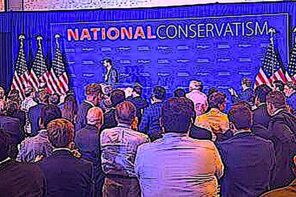Two posts by wildly disparate bloggers get at more or less the same question: what is it that holds “us” together, anyway?
Stephanie Zvan asks the question in one form: how polite do atheists need to be as they advocate their positions?
The mostly-sensible answer she comes up with is that however annoying “less than polite” atheists like PZ Myers are, they serve useful functions in the social discourse on religion. For one thing, they highlight the disproportionate nature of religious perspectives on non-belief (really, is stealing a communion wafer as bad as making death threats?). For another, the not-polite allow the polite to play “good cop” in the discourse.
On the whole, I find Zvan’s argument persuasive. You only have to scroll down to the first comment on her post to discover why she might find it useful to have PZ Myers as a lightning rod. Or check out the controversy over atheist bus ads in Des Moines, a story Zvan herself cites. For goodness’ sake, what is so offensive about a factual statement like “You are not alone”?
In any event, Rod Dreher takes the question from a different angle, wondering what keeps various sub-cultures from taking the sectarian route and cutting themselves off from wider society. Dreher excerpts a poorly-typed quote from James Davidson Hunter’s Culture Wars to ask about the limits of diversity in a democratic society:
When the content of public life — the prevailing vision of the good and the just — is decided principally through the competition of pwer and interests, there is reason to pause and wonder. Can a liberal democracy remain not just superficially functional but health and robust without an elementary and somewhat universal agreement in the publci realm about the criteria for distinguishing the social good from the socially destructive or about the rules of reason for making equitable public policy?
The reply of most moral and political philosophers to this question tends to be simply, “probably not.” The nub of disagreement in these circles is over just how dismal the situation is.
This is the usual tendentiousness from both Dreher and Hunter. Culture Wars was conceptually an attack on John Rawls’ concept of “overlapping consensus” as the glue of a liberal society. Hunter was anxious to demonstrate that the agreements Rawls saw in political discourse were constantly made and unmade, that the core of the American polity was seriously frayed because there was no one set of core values to hold things together.
Hunter erred seriously, however, by not considering the partisan drivers behind the so-called culture wars. Simply put, the GOP sought to advance its “pwer and interests” by pushing the narrative of a divided society – a narrative both Hunter and Dreher have swallowed, hook, line, and sinker. Republicans didn’t like the consensus on “equitable public policy,” at least when it came to economics, so they sought to overturn it by an appeal to social and (coded) racial resentment. Asking how the center can hold under such circumstances without considering whose interests division serves is a bit like lamenting school violence when your kid’s face makes the disruptive choice to get in the way of a bully’s fist.
More to the point, perhaps, there has never been a point in American history when “the prevailing vision of the good and the just” has not been “decided principally through the competition of power and interests.” The Founding Fathers tried every which way they could to rise above “factionalism.” In the end, they settled for balancing competing interests, realizing that trying to get rid of them was a fool’s errand.
To the extent that religion or any other social bulwark pushed a universal agreement on the social good, then, it has been a false consensus. Americans have never been in full agreement about the purpose or direction of their common enterprise. In fact, you might argue that the only thing that unites us is our shared disagreement on the big questions.
The technological innovations of the internet age doesn’t worsen the situation, necessarily, but it does sharpen the contrasts. It used to be that you’d only hear from bigoted professors or crackpot pastors if you were unlucky to live next to them or read the newspapers or journals in which they were allowed to publish. These days, every idiot and his dog has a blog, a Twitter feed and a Facebook page. That increases geometrically the opportunities for disagreement and conflict.
But you know what? Viva la conflict! The answer to bad speech isn’t good speech — it’s more speech. A robust and mature political discourse, however uncomfortable, will do more to shut down pinheaded proto-fascist teabaggers than 10,000 calls for civility ever could. Like it or not, we do have differing levels of power, and we do have competing interests. The only way to hash them out, absent brute force, is to talk, sometimes passionately, even stridently.
That of course is not open license for any kind of bile, venom, or poison. The Golden Rule is still a good guideline, I think.
On the other hand, I’ll take a barbaric yawp over cold silence any day. There is no margin in pretending that substantial differences do not exist in our society or our politics. Entering into conversation around those differences does not lessen their power, necessarily. Nor does it mean that they become more comfortable to talk about. It certainly does not guarantee that they can be transcended. What conversation does ensure is that we fulfill our responsibility as citizens to deliberate the issues set before us. We may spark and clash all we want, but as long as we’re engaged, we remain connected. And even unpleasant connection remains a better alternative than the most civil of separatism.
To put it differently, thank God for PZ Myers. That man chaps my behind. He and I have no reasonable hope of ever coming to a perfect agreement on the social good, though we might achieve overlapping consensus. But he usually takes the issues of belief and reason seriously, and even when he doesn’t, he forces me to do so. For that, he is “good health to me nevertheless.” I am a better man and a better citizen for having to consider his perspective, even if I do wish he’d go jump in the lake more than just occasionally.
That might not make us the best society possible, but it does have the virtue of holding us together, in however unlovely and democratic a form as we might have.




